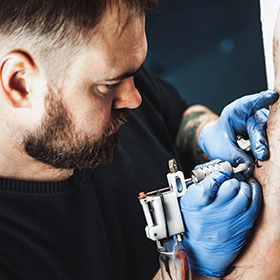Sweating can be harmful for a new tattoo. Excess moisture may lead to infection or slow healing.
Getting a new tattoo is exciting. But it’s important to care for it properly. Your fresh ink needs time to heal. Sweat can create a damp environment. This can be a breeding ground for bacteria. It can also cause irritation.
Your skin is sensitive after getting a tattoo. Proper aftercare is crucial to keep the design looking great. Knowing how sweat affects your new tattoo can help you avoid problems. In this blog post, we will explore how sweating impacts your tattoo’s healing process and what you can do to protect it.
Introduction To Tattoo Healing
A new tattoo is an open wound. It needs special care to heal well. Aftercare is very important. It helps prevent infections. It also keeps the tattoo looking good.
After getting a tattoo, follow your artist’s instructions. Keep the tattoo clean. Use mild soap and water. Pat it dry with a clean towel. Apply the recommended ointment. Do not pick at scabs. This can cause scarring.
| Stage | Description |
|---|---|
| 1-2 days | Red and swollen |
| 3-7 days | Scabbing begins |
| 1-2 weeks | Itching and peeling |
| 3-4 weeks | Final healing |
What Happens When You Sweat
Sweating can harm a new tattoo by causing irritation and slowing the healing process. Keep your tattoo dry and clean to prevent infection. Avoid intense workouts and hot environments to protect your fresh ink.
Sweat Composition
Sweat is made of water, salt, and small amounts of other chemicals. These include urea, ammonia, and sugar. Sweat helps to cool your body. But it can also irritate your skin. Especially if you have a new tattoo.
Impact On Skin
New tattoos are like open wounds. Sweat can cause infections. It can also cause itching and redness. This can make healing slower. Always keep your new tattoo clean and dry.
Sweating And Fresh Tattoos
Sweating can harm a fresh tattoo. Sweat contains salt. Salt can irritate new ink. This might slow down healing. It can also cause infections. Bacteria thrive in sweat. They can enter the tattoo. This can lead to redness, swelling, and pain. Avoid heavy exercise. Stay in a cool place. Keep the tattoo clean and dry.
Watch for signs of complications. Redness around the tattoo is a warning. Swelling is another sign. Pain that gets worse is not good. Pus or yellow fluid means infection. If the tattoo itches a lot, it might be infected. Fever is a serious sign. See a doctor if these signs appear.
Activities To Avoid
Sweating can harm a new tattoo by causing irritation and potential infection. It’s best to avoid intense workouts and hot environments. Keep your tattoo clean and dry for optimal healing.
Physical Exercise
Exercise can cause sweating. Sweat can affect a new tattoo. Sweat contains salt. Salt can irritate the tattoo. Irritation can slow healing. Avoid heavy workouts. Light exercise is better. Walking is okay. No running or gym workouts. Swimming is bad too. Water can harm the tattoo. Be careful.
Heat Exposure
Heat can make you sweat. Avoid saunas and hot tubs. Hot weather is risky. Stay in cool places. No direct sunlight. Sun can damage a new tattoo. Use loose clothing. Tight clothes can rub the tattoo. Rubbing can cause pain. Pain can lead to infections. Keep your tattoo clean and dry.
Tips For Reducing Sweat
Stay in a cool place to reduce sweating. Use fans or air conditioning. Avoid hot and humid areas. This helps your new tattoo heal better. Cool environments keep your skin dry. Dry skin protects the tattoo.
Wear light and breathable clothes. Choose cotton or linen fabrics. Avoid tight or heavy garments. Light clothing helps your skin breathe. This reduces sweat on your new tattoo. Loose clothes prevent rubbing on the tattoo. This aids in quicker healing.
Cleaning Your Tattoo
Sweating can harm a new tattoo, causing irritation and increasing the risk of infection. Keep your tattoo clean and dry to ensure proper healing.
Proper Washing Techniques
Use lukewarm water to clean your tattoo. Hot water can harm it. Gently pat the tattoo dry with a clean towel. Never rub it. Rubbing can irritate the skin and damage the tattoo.
Wash your hands before touching your tattoo. This keeps germs away. Use a mild, fragrance-free soap. Harsh soaps can cause problems. Rinse your tattoo well to remove all soap.
Recommended Products
Choose soaps made for sensitive skin. Brands like Dove and Cetaphil are good choices. Look for products with no alcohol or fragrance. These can dry out your skin. Avoid using lotions with strong scents. They can cause irritation.
Avoid using rough washcloths or sponges. These can damage your tattoo. Always use your hands to wash the area. This method is gentle and safe.
Managing Infection Risk
Redness and swelling may mean an infection. Pus and pain are other signs. The skin might feel hot. You may also see red streaks. These can spread out from the tattoo.
Always seek help if the tattoo gets worse. A doctor can give proper care. They might prescribe antibiotics. Do not wait too long. Infections can get serious fast.
Long-term Tattoo Care
Keeping your tattoo moisturized is crucial. Use a fragrance-free lotion. This helps the skin stay soft. Apply the lotion in a thin layer. Do this twice a day. Too much lotion can clog pores. This may cause pimples. Pimples can harm the tattoo.
Sun can fade a tattoo fast. Always use sunscreen. Choose SPF 30 or higher. Cover your tattoo when outside. Wear clothes that block the sun. This protects your tattoo. Sunburn can also damage the skin. This makes the tattoo look bad.
Conclusion
Sweating with a new tattoo needs careful attention. Keep it clean and dry. Follow your artist’s aftercare advice for best results. Avoid heavy workouts during the healing process. Light activities are usually safe. Always listen to your body. If irritation occurs, consult a professional.
Patience ensures your tattoo heals well. Enjoy your new ink responsibly.

